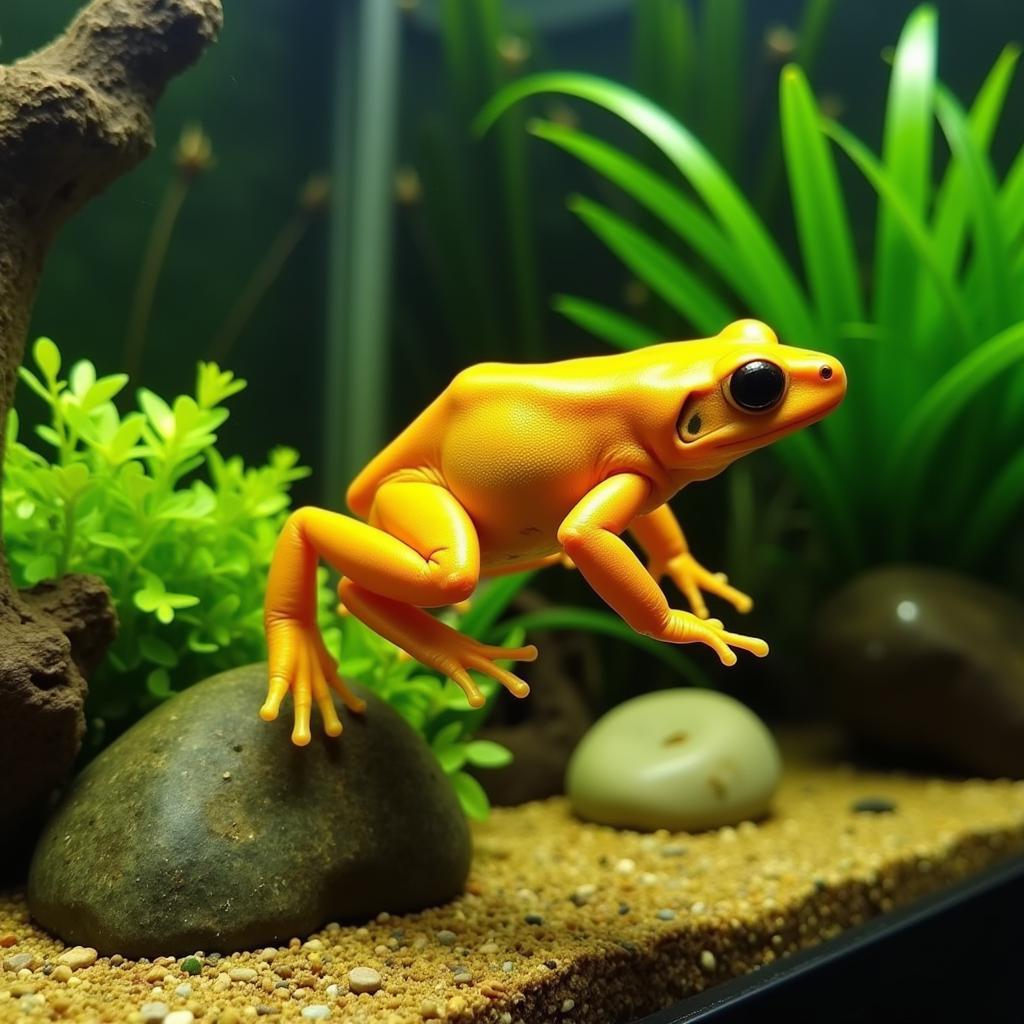African Dwarf Frog Lying on Back: Is It Normal?
Seeing your African Dwarf Frog Lying On Back can be alarming, especially if you’re a new frog owner. Is it sick? Is it dying? These are common questions, and understanding why your aquatic frog exhibits this behavior is key to ensuring its well-being. This article will explore the various reasons behind this posture and help you differentiate between normal behavior and signs of distress.
Understanding Normal African Dwarf Frog Behavior
African dwarf frogs are fascinating creatures with unique aquatic habits. Unlike their terrestrial counterparts, they spend their entire lives underwater. Their posture, including instances of lying on their back, often provides clues about their health and well-being. Sometimes, a seemingly concerning position is simply part of their natural behavior. african dwarf frog behavior
One common behavior that often startles new owners is “surface breathing.” African dwarf frogs have lungs and need to gulp air from the surface. During this process, they may momentarily float on their backs or sides, appearing lifeless. This is completely normal and nothing to worry about. They’ll quickly right themselves after taking a breath.
Another typical behavior is resting. African dwarf frogs can be quite lazy and often rest in seemingly odd positions, including on their backs or sides, particularly amongst plants or near the bottom of the tank. This is especially true after a meal, as they become more buoyant.
When is an African Dwarf Frog Lying on Back a Problem?
While resting on their back can be normal, it can also be a sign of illness. Bloat, a common ailment in african dwarf frogs, can cause them to become overly buoyant and float on their backs involuntarily. This is often accompanied by a swollen abdomen and lethargy.
Another serious condition is Dropsy, which also causes swelling and buoyancy issues. A frog with Dropsy will often lie on its back and struggle to right itself. If you notice your frog persistently floating on its back, unable to control its position, it’s crucial to consult a veterinarian specializing in aquatic animals.
Why is My African Dwarf Frog Floating Upside Down?
A frog floating upside down often signifies a buoyancy issue, usually related to bloat or Dropsy. Gas accumulation in the digestive system can cause the frog to become lighter than water, resulting in an inverted floating posture. This is a serious symptom that requires immediate attention.
How Can I Tell If My African Dwarf Frog is Just Resting or Sick?
Observe your frog’s overall behavior. Is it eating normally? Is it active and responsive? If your frog is exhibiting other symptoms alongside the back-lying posture, such as lethargy, loss of appetite, or skin discoloration, it’s likely a sign of illness. If the frog rights itself easily after a short while and continues its normal activities, it’s likely just resting.
Ensuring Your African Dwarf Frog’s Health
Maintaining a clean and appropriately sized tank with proper water parameters is essential for the health of your african dwarf frog. Regular water changes and a balanced diet can help prevent many common ailments. Providing hiding places and a varied environment can also reduce stress and promote natural behaviors. african dwarf frog behavior
 Healthy African dwarf frog swimming in a planted tank
Healthy African dwarf frog swimming in a planted tank
Conclusion
Observing an african dwarf frog lying on back can be concerning, but it’s not always a cause for alarm. Understanding the difference between normal resting behavior and signs of illness is crucial for responsible frog ownership. By paying close attention to your frog’s overall behavior and maintaining a healthy tank environment, you can ensure your aquatic companion thrives.
FAQ
- Is it normal for african dwarf frogs to sleep on their backs? Yes, they can rest in various positions, including on their backs.
- What does it mean if my african dwarf frog is floating upside down? This often indicates a buoyancy problem, possibly due to bloat or Dropsy.
- How can I prevent bloat in my african dwarf frog? A proper diet, clean water, and a stress-free environment are key.
- Should I be worried if my frog floats on its back briefly after surfacing? No, this is normal surface breathing behavior.
- How often should I change the water in my african dwarf frog tank? Partial water changes are recommended weekly or bi-weekly.
- What should I feed my african dwarf frog? A diet of commercial frog food, supplemented with bloodworms or brine shrimp, is ideal.
- Do african dwarf frogs need a filter? Yes, a gentle filter is essential for maintaining water quality.
If you have questions regarding this or any other aspects of African dwarf frog care contact our helpline:
Call: +255768904061
Email: kaka.mag@gmail.com
Visit us: Mbarali DC Mawindi, Kangaga, Tanzania.
Our customer care team is available 24/7.


